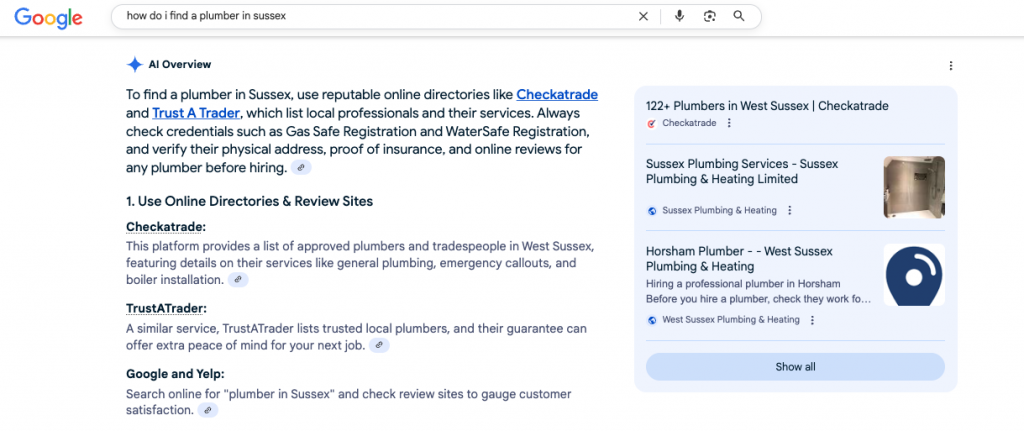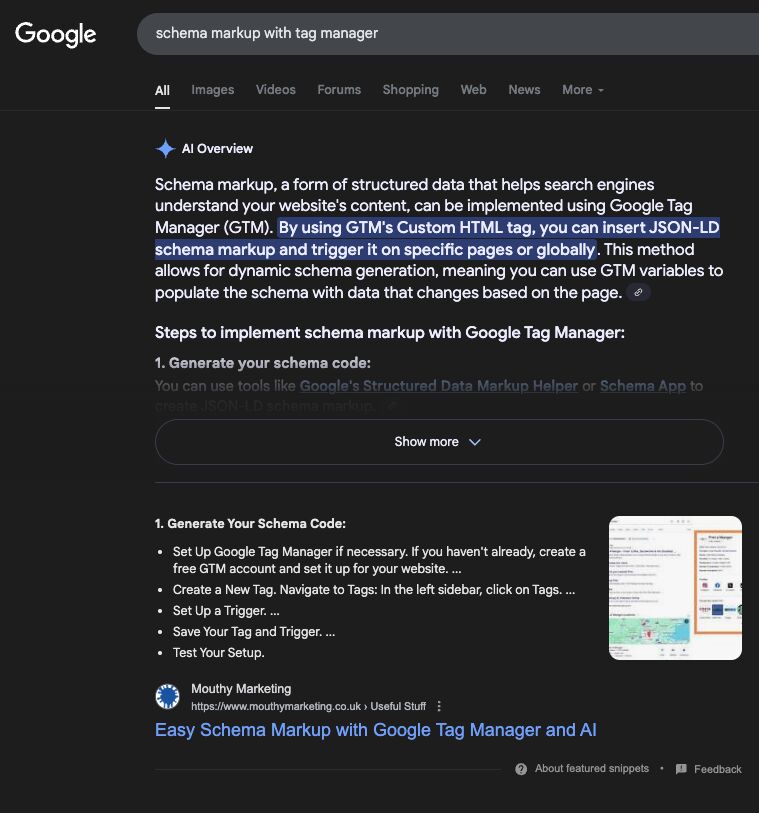Small and local business owners increasingly notice that customers rely on AI tools like ChatGPT, Bing AI, and Google’s AI integrations to find services and products. Traditional search engine optimisation (SEO) still matters, but showing up in AI-driven overviews requires a slightly different approach. GEO, or generative engine optimisation, sometimes called AIEO builds on many of the same principles as local SEO, so businesses familiar with standard optimisation will find it approachable rather than intimidating. Companies without a plan risk being invisible when AI assistants generate summaries or recommendations for potential clients.
This blog explains how to rank in AI overviews using practical, actionable steps. You will learn how to optimise your online presence for generative engines, using GEO (or AIEO) and local SEO. From structured data to social signals, the techniques outlined here help ensure your business appears when AI summarises local services, making it easier for prospective customers to find and choose you.
Understanding GEO (Generative Engine Optimisation)
GEO focuses on improving how AI tools interpret and recommend your business. It uses many of the same principles as local SEO, making it straightforward for businesses that already have a handle on standard optimisation.

GEO ensures that your location, services, and key content are clearly communicated to generative engines. This includes optimising structured data, maintaining consistent listings across directories, and producing helpful content that answers common customer questions. AI tools like ChatGPT or Bing AI can then accurately summarise your business for relevant searches. By combining GEO with standard SEO practices and social signals, businesses improve both traditional search visibility and presence in AI-driven results.
Why ranking in AI overviews matters
AI-powered tools summarise data from across the web to provide concise answers. For local businesses, this creates an opportunity to reach customers through AI recommendations rather than relying solely on traditional search results.
Over 40% of internet users rely on AI assistants for product and service recommendations
Recent trends suggest that over 40% of internet users rely on AI assistants for product and service recommendations. Businesses optimised for AI can increase visibility, attract higher-quality leads, and generate more revenue.
Benefits of ranking in AI overviews include:
- Enhanced visibility for local searches and niche markets.
- Increased trust and authority as AI consistently cites your business.
- Better alignment with customer behaviour as AI tools grow in everyday use.
Implementation: How to rank in AI overviews
Step 1: Optimise your structured data

Structured data or schema markup helps AI understand your business information. This includes opening hours, services, pricing, and location. Use JSON-LD schema on your website to ensure AI can extract accurate details.
- Add LocalBusiness schema for your address, phone number, and service area.
- Include FAQPage schema to cover questions AI might surface, such as “How do you get your business to show up in ChatGPT?”
Step 2: Focus on local SEO
- Ensure your business listings are consistent across Google Business Profile, Bing Places, and relevant directories.
- Include location-specific terms naturally in your website copy and metadata.
- Encourage local reviews that highlight specific neighbourhoods or areas you serve.
Step 3: Build social signals and online presence
- Maintain active social media profiles and share updates about your services.
- Encourage clients to leave reviews on Google, Facebook, and niche platforms.
- Monitor your reputation to ensure AI receives accurate, positive data about your business.
Adding an FAQ section can directly improve your chances of appearing in AI summaries.
Step 4: Add FAQs on your site
Adding an FAQ section can directly improve your chances of appearing in AI summaries. Include questions such as:
- How do you get your company on AI Overview?
- How to appear in AI results?
- How to make AI recommend your business?
- How do you get your business to show up in ChatGPT?
Internal linking to related content helps AI understand your site structure. For example, link FAQ answers to service pages or blog posts for more context.
Step 5: Apply general SEO best practices
- Optimise meta titles and descriptions to reflect relevant services and locations.
- Structure content with subheadings and clear paragraphs for readability.
- Ensure internal linking is logical, connecting FAQs, service pages, and supporting content.
- Use relevant keywords naturally across headings and body content.
Common mistakes to avoid
Mistake 1: Ignoring structured data – How to avoid: Implement LocalBusiness and FAQPage schema on your site and ensure it is accurate and up-to-date.
Mistake 2: Inconsistent business listings – How to avoid: Audit all local directories and ensure your name, address, and phone number match exactly across platforms.
Mistake 3: Neglecting reviews and social presence – How to avoid: Actively request reviews, respond to feedback, and keep social media profiles current to reinforce credibility for AI summaries.
Case study: A solar installer in Sussex
A solar company in Sussex asked us to increase visibility and attract qualified local leads. We implemented schema markup to make essential business information like services, location, and opening hours easily readable by AI and search engines.
Listings across local directories were audited and optimised for consistency, reinforcing credibility in AI and search results. We created high-quality supporting content including blogs, guides, and FAQs that answered common questions about solar installation, maintenance, and financing. Standard SEO tactics were applied across the site, including optimised meta titles and descriptions, structured content with subheadings, and logical internal linking.
Within three months, our client’s website traffic increased by 30% and service enquiries grew by 25%
Within three months, our client’s business appeared prominently in AI-generated summaries and local search results. Website traffic increased by 30% and service enquiries grew by 25%. This demonstrates how GEO, structured data, supporting content, and solid SEO combine to deliver tangible, measurable growth.
For local SEO tips for Sussex businesses, check out our handy article. Discover why local SEO tactics can differ according to location.
Futureproof your business with GEO
Ranking in AI overviews gives your business a visible presence where customers are increasingly searching first. Combining structured data, GEO, local SEO, social signals, and solid SEO practices ensures your business appears in AI-generated summaries, helping attract high-quality leads and maintain credibility online.
At Mouthy Marketing, we help businesses to be visible across search engines and AI overviews. We focus on what drives leads, conversions, and growth, without overcomplicating things.
If you’re ready to dominate the AI results, get in touch.
FAQs
How do you get your company on AI Overview?
Use structured data like LocalBusiness and FAQPage schema, optimise your website for GEO, and maintain consistent online listings. AI pulls data from these sources to generate overviews.
How to appear in AI results?
Ensure accurate, consistent business information, optimise local SEO, and create content that answers customer questions clearly.
How to make AI recommend your business?
Encourage positive reviews, build a social presence, and keep your website updated with relevant content. Generative engines prioritise well-documented and credible businesses.
How do you get your business to show up in ChatGPT?
Maintain high-quality, structured data across platforms. AI summarises publicly available information, so accurate listings, FAQs, and active social signals help your business appear.
What is GEO in AI overviews?
GEO (generative engine optimisation) improves your business’s visibility in AI summaries by combining local SEO, structured data, and helpful content to increase relevance for local queries.
